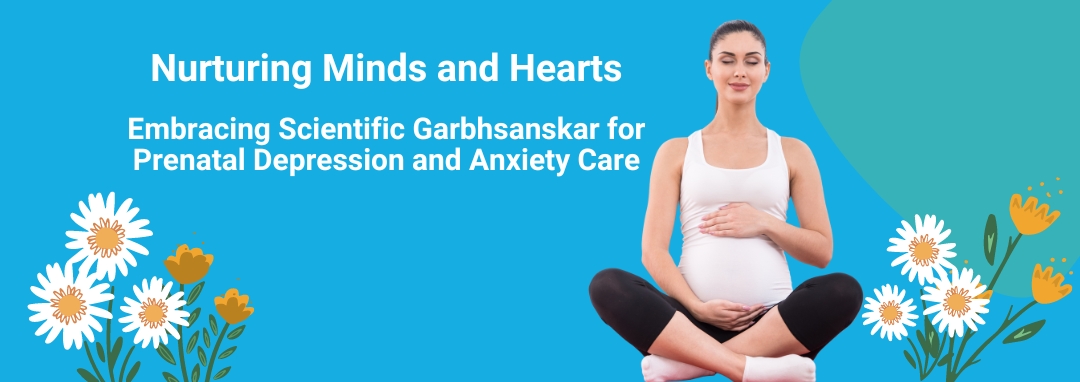Pregnancy is often seen as a joyous journey filled with anticipation and dreams. However, behind this happiness, many expecting mothers silently grapple with prenatal depression and anxiety – emotional challenges that are often overlooked. In this blog, we’ll explore the significance of recognizing and addressing prenatal depression and anxiety while delving into the potential benefits of Scientific Garbhsanskar, combined with effective pregnancy care, in promoting emotional well-being during pregnancy.
Understanding Prenatal Depression and Anxiety
Prenatal depression and anxiety are significant psychological conditions affecting pregnant individuals. They go beyond simple mood swings, posing considerable effects on the emotional health of both the mother and the developing fetus. Integrating Scientific Garbhsanskar, a traditional practice that highlights the connection between a mother’s emotions and the baby’s development, with modern scientific understanding further emphasizes the importance of emotional well-being during pregnancy.
Prenatal depression involves persistent feelings of sadness and hopelessness, while prenatal anxiety entails excessive worry and restlessness. These emotions can lead to physical symptoms like sleep disturbances and changes in appetite. By incorporating Scientific Garbhsanskar techniques, which encourage positivity and emotional balance, we may enhance the emotional well-being of both the mother and the unborn child.
Impact on Mother and Child
Prenatal depression and anxiety have implications beyond emotional distress. Research indicates that these conditions can impact maternal health and fetal development. Expectant mothers experiencing these challenges are at higher risk for complications during pregnancy and childbirth. Additionally, such emotional struggles can hinder the mother-baby bonding process and pose challenges for newborn care.
By embracing Scientific Garbhsanskar practices – such as relaxation exercises, meditation, and positive affirmations – we can potentially mitigate the impact of stress hormones on both the mother and the developing baby. This holistic approach aims to create a more positive emotional environment during pregnancy.
Causes and Triggers
Prenatal depression and anxiety stem from a complex interplay of biological, hormonal, psychological, and social factors. Hormonal changes during pregnancy can lead to mood shifts and emotional challenges. Family history of mental health issues can also contribute, making some individuals more susceptible. Modern pregnancy care recognizes the need to address these factors through regular assessments and emotional support.
External triggers like relationship stress, financial worries, and societal pressure can exacerbate these conditions. Pregnancy itself brings significant emotional and physical changes that, if not managed effectively, can lead to heightened anxiety and depression. Integrating Scientific Garbhsanskar practices can provide coping mechanisms and promote emotional resilience.
Breaking the Stigma
One of the challenges in addressing prenatal depression and anxiety is the stigma around mental health. Expecting mothers may feel pressured to portray constant happiness, deterring them from seeking help. This stigma obstructs open discussions and delays access to essential support.
Recognizing the Signs
Raising awareness about the signs of prenatal depression and anxiety is essential. Persistent sadness, irritability, changes in sleep and appetite, constant worry, and physical symptoms like headaches should not be ignored. Loved ones, healthcare providers, and practitioners of Scientific Garbhsanskar must collaborate to identify these signs early.
Seeking Professional Help and Scientific Garbhsanskar Approach
Similar to physical health, mental well-being requires attention during pregnancy. Seeking professional help, including therapy and counselling, is vital. Scientific Garbhsanskar practices can complement these efforts, enhancing emotional harmony and resilience.
Building Support Systems
The support of family, friends, and partners is invaluable for pregnant individuals dealing with depression and anxiety. Creating a safe space for open communication can reduce isolation. Partners involved in Scientific Garbhsanskar techniques can foster mutual understanding and emotional support.
Pregnancy is a transformative journey. Addressing prenatal depression and anxiety through the integration of Scientific Garbhsanskar and evidence-based pregnancy care is crucial for both the mother and the unborn child. By recognizing the signs, breaking the stigma, seeking professional help, and embracing holistic practices, we ensure that every expecting mother receives comprehensive care. As society celebrates the joys of pregnancy, let us also prioritize emotional well-being, thereby nurturing both minds and hearts and providing a healthier start for every growing family
.
Discover more insightful blog posts by Dr Megha Shah


